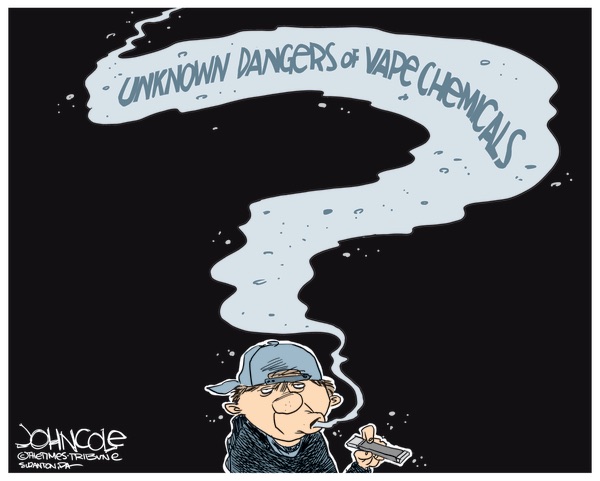In light of the recent vaping-related lung injury outbreak on the national stage, as well as more local complaints centered around odor, cannabis has become a focus of contention. Throughout history, many new industries have faced hard-hearted resistance. Before attending graduate school, and moving to Buellton, I worked in coffee. Today, coffee is a commodity that most consider pedestrian, but it was once a new industry and a controversial one at that.
Harvard Professor Calestous Juma gives us an account of coffee’s history: In the early 16th century, coffee was introduced in Yemen from its native habitat in Ethiopia. Early coffee consumers were met with opponents claiming that it should be prohibited until proven safe to consume. A prominent scholar named al-Dhabani personally traveled to Ethiopia and witnessing coffee consumption; he claimed it was safe. This did not detract opposition to the drink. Subsequent testimony was provided by Persian physicians who claimed that coffee was “endowed with vile characteristics,” prompting new legislation to prohibit the drink. Even when these testimonies were debunked, jurists in Mecca passed legislation banning coffee. Coffee found by authorities was confiscated and burned; traffickers were beaten and told they would be denied entry into heaven.
Coffee didn’t fare any better when it arrived in England. “The Women’s petition against coffee, representing to public consideration the grand inconvenience accruing to their sex from excessive use of the drying and enfeebling drink Liquor” was in wide circulation at the time. This petition invoked the fear of impotence and concluded that coffee be prohibited for people under the age of sixty, recommending that they consume beer and other alcoholic spirits instead. Coffeehouses were a center for social and political dissent at the time. King Charles II used the opportunity to further his political agenda. He issued the proclamation for the suppression of coffeehouses, the reason given for passing such legislation was that coffeehouses were the source of malicious statements devised to defame the king and undermine public order. Imagine indicting your local roaster on the charges of undermining public order.
Looking at coffee’s early history you will notice many parallels with cannabis in the United States. Baseless, publicly funded propaganda works like Reefer Madness were produced in the 1930s suggesting that cannabis use leads to hallucinations, madness, manslaughter, suicide, and attempted rape. Federal prohibition has achieved very little outside the disproportional mass incarceration of minorities. Much of the stigma around cannabis still lingers today. Society instinctively fears change, but we shouldn’t let our instincts overwhelm our capacity to make evidence-based policies.
The new wave of fears surrounding the linkage between lung injury and cannabis-based vaporizers is more complicated than what can be captured by sensationalized headlines. I offer evidence that the legal California cannabis market is one of the most regulated agricultural commodities in the United States. California’s Bureau of Cannabis Control (BCC) has legislated that licensed laboratories carry out testing on all cannabis-based products before they are made available to the public. Legal cannabis products must go through a battery of tests before receiving a certificate of analysis. The analysis includes a potency test, a foreign materials screening, a test for heavy metals presence, a microbial impurities test, a screening for mycotoxins, residual solvents, and over 60 residual pesticide compounds. You will be hard pressed to find many consumer products that require this level of analytical rigor.
Early investigation results into the linkage of the lung-injury outbreak suggest that Vitamin E acetate, a residual solvent, is the cause. This reflects a shortcoming in good manufacturing practices in the extract manufacturing process of vaporizer technology rather than a health hazard presented by the cannabis plant’s constituents. In addition, a Los Angeles-based analytical laboratory randomly sampled illegal vapes in circulation and found that the vast majority contained the residual solvents while legal cannabis vapes did not. In light of this evidence, I ask the reader if it is warranted to pin this crisis on the cannabis sector?
Federal prohibition has pushed the vast majority of the cannabis industry into the black market. While recent legislation has allowed California companies to operate in the legal market, the informal one still persists. Another result of federal prohibition is the absence of scientific data to support claims of cannabis health risks or benefits. Public universities have not undertaken research in this field since they receive federal grants; this has created an information void leaving the public to rely on anecdotal evidence. Cannabis farmers do not have extension services from federally funded land grant universities. They also lack many resources afforded to farmers in other agricultural verticals.
What brought me to this field is its infancy. I’m interested in empirical data-driven plant science. Local complaints around the smell are well-founded and should not be ignored, but our approach should be to leverage science and technology to resolve these issues. The public deserves more scientific evidence and more engagement from stakeholders.
The author is employed at a cannabis-testing lab, but expresses only his own opinion.

 on Google
on Google 


